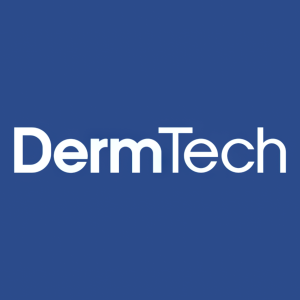DermTech Simplifies the DermTech Melanoma Test (DMT) by Discontinuing the Optional TERT Add-on Assay
- Trust 2 Study confirms negative predictive value (NPV) of
- Optional TERT promoter mutation testing does not significantly alter sensitivity, NPV or positive predictive value (PPV)
Multiple studies, including the Company’s recently completed Trust 2 Study, demonstrated the DMT’s negative predictive value (NPV) to be
“Clinician feedback, in addition to the Trust 2 Study results, suggests that the TERT promoter mutation add-on assay has limited impact on decision-making when evaluating pigmented lesions for melanoma,” said Loren Clarke, M.D., chief medical officer, DermTech. “The DMT will now consist of the foundational gene expression assay for LINC00518 and PRAME. With an NPV that remains at
“These findings establish in a large real-world cohort that the DMT’s high NPV is not enhanced by the addition of TERT mutation testing,” commented Laura K. Ferris, M.D., Ph.D., Professor of Dermatology, University of Pittsburgh School of Medicine, and a participant in the study.
About The DermTech Melanoma Test
DermTech originally marketed its foundational assay under the name Pigmented Lesion Assay (PLA). The PLA assesses pigmented skin lesions, moles or dark skin spots for melanoma. In particular, the PLA detects expression of the LINC00518 (LINC) and preferentially expressed antigen in melanoma (PRAME) genes using reverse transcription-polymerase chain reaction (RT-PCR). The Company introduced an add-on assay to PLA in 2021, which is designed to identify the presence of mutations in TERT gene promoter region using DNA sequencing. The Company has since branded its PLA and TERT add-on-assay as the DermTech Melanoma Test (DMT). The DMT may be ordered with or without the add-on test for TERT. Positive results for LINC, PRAME or TERT correlate with a lesion at higher risk for melanoma. If none of the biomarkers are detected, this result indicates a
About DermTech
DermTech is a leading genomics company in dermatology and is creating a new category of medicine, precision dermatology, enabled by its non-invasive skin genomics technology. DermTech’s mission is to improve the lives of millions by providing non-invasive precision dermatology solutions that enable individualized care. DermTech provides genomic analysis of skin samples collected using its Smart Stickers™. DermTech develops and markets products that facilitate the assessment of melanoma. For additional information, please visit DermTech.
Forward-Looking Statements
This press release includes “forward-looking statements” within the meaning of the “safe harbor” provisions of the Private Securities Litigation Reform Act of 1995. The expectations, estimates, and projections of DermTech may differ from its actual results and consequently, you should not rely on these forward-looking statements as predictions of future events. Words such as “expect,” “estimate,” “project,” “budget,” “forecast,” “runway,” "outlook," “anticipate,” “intend,” “plan,” “strive," “may,” “will,” “sustain,” “could,” “should,” “believe,” “predict,” “potential,” “continue,” and similar expressions are intended to identify such forward-looking statements. These forward-looking statements include, without limitation, expectations and evaluations with respect to: the performance, patient benefits, cost- effectiveness, commercialization and adoption of DermTech’s products and the market opportunity for these products; expectations regarding DermTech’s potential growth, scale, patient reach, financial outlook, including its cash runway and future financial performance DermTech’s ability to increase its test volume, revenue and the proportion of reimbursed billable tests and control or reduce cost, expenses and cash burn; and expectations regarding agreements with or reimbursement or cash collection patterns from government payers (including Medicare) or commercial payers and related billing practices or number of covered lives. These forward-looking statements involve significant risks and uncertainties that could cause the actual results to differ materially from the expected results. Most of these factors are outside of the control of DermTech and are difficult to predict. Factors that may cause such differences include, but are not limited to: (1) the outcome of any legal proceedings that may be instituted against DermTech; (2) DermTech’s ability to obtain additional funding to develop and market its products; (3) the existence of favorable or unfavorable clinical guidelines for DermTech’s tests; (4) the reimbursement of DermTech’s tests by government payers (including Medicare) and commercial payers; (5) the ability of patients or healthcare providers to obtain coverage of or sufficient reimbursement for DermTech’s products; (6) DermTech’s ability to grow, manage growth and retain its key employees and maintain or improve its operating efficiency and reduce operating expenses; (7) changes in applicable laws or regulations; (8) the market adoption and demand for DermTech’s products and services together with the possibility that DermTech may be adversely affected by other economic, business, and/or competitive factors; and (9) other risks and uncertainties included in the “Risk Factors” section of the most recent Annual Report on Form 10-K filed by DermTech with the Securities and Exchange Commission (the “SEC”), and other documents filed or to be filed by DermTech with the SEC, including subsequently filed reports. DermTech cautions that the foregoing list of factors is not exclusive. You should not place undue reliance upon any forward- looking statements, which speak only as of the date made. DermTech does not undertake or accept any obligation or undertaking to release publicly any updates or revisions to any forward-looking statements to reflect any change in its expectations or any change in events, conditions, or circumstances on which any such statement is based.
View source version on businesswire.com: https://www.businesswire.com/news/home/20240116386434/en/
Steve Kunszabo
DermTech
(858) 291-1647
steve.kunszabo@dermtech.com
Source: DermTech, Inc.







